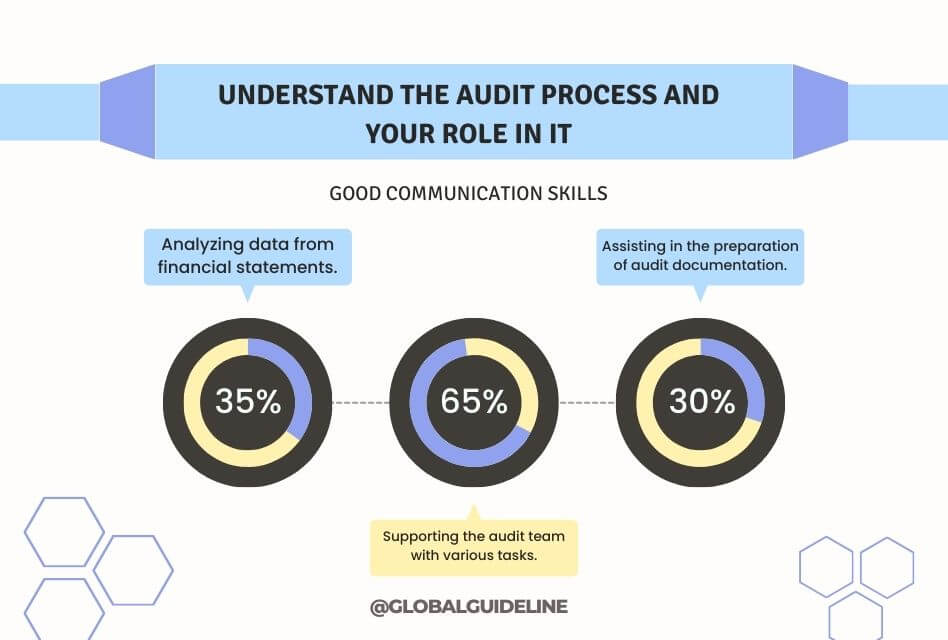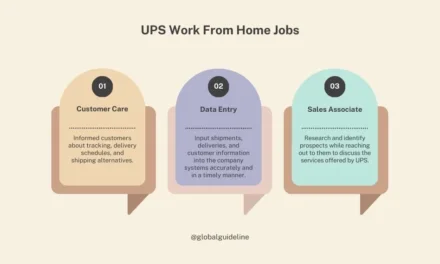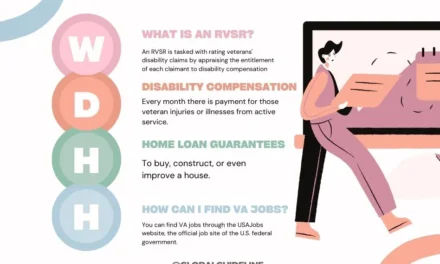Most college students and fresh graduates today are excited about starting the audit internship opportunity that brings them closer to the accounting and finance world. Know what’s expected, whether you are joining a Big 4 firm or just a smaller public accounting firm. This article reviews what you need to know in order to be successful in the role of an audit intern in the United States of America. It is going to provide you with what you need to know to do your best work.
Table of Contents
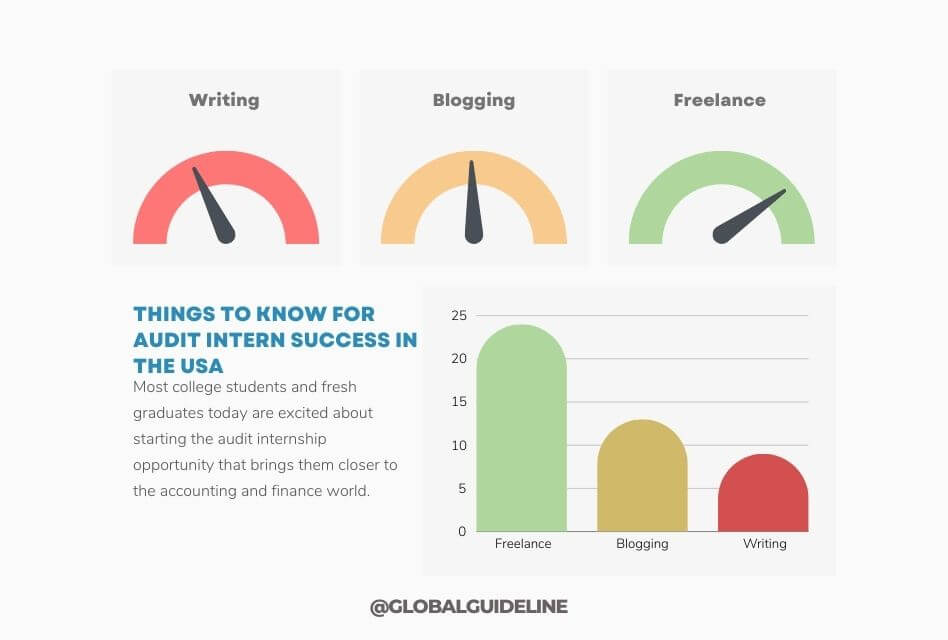
1. Understand the Audit Process and Your Role in It
One of the key things you need to understand as an audit intern is the audit process itself. Audit refers to looking into a company’s financial statements and related operations such that these can be obtained as reliable and in accordance with applicable regulations. You will be performing data from financial statements with needed analysis, preparing audit documentation, and assisting audit teams in other tasks within this role.
- Analyzing data from financial statements.
- Assisting in the preparation of audit documentation.
- Supporting the audit team with various tasks.
What to Expect from an Audit Intern What will your role be in a firm? Typically, you will assist the audit team with their day-to-day work, support documentation, and sometimes attend client meetings. Some of the key things to know in being a successful audit intern include understanding you are part of a team working toward a purpose and your small contribution matters.
2. Development of Good Communication Skills
Communication is the very heart of the auditing world. You will have to communicate well to your members, managers, and sometimes even clients. Good communication skills early on will really help you navigate complexities in the audit process and develop your professional relationships.
Internal Communication
Communication in your team shall be clear and concise in that you finish work effectively. The same clarity matters when you are either sending emails, attending meetings, or even documenting what you have done.
External Communication
Most of the time if you interact with your clients, it means you need to understand how you communicate. Clients don’t care to read accounting jargon, so this ability to explain to them issues in simple terms can be vital.
To succeed in an audit internship, improve your communication skills. The better you are able to communicate what you are thinking, whether it is on paper or when speaking, the greater your chances will be of success during that internship and later as a professional.
3. Get Familiar with Audit Software and Tools
When you are on audit internship, you will become aware of different types of software that assists in the audit process. You may find it pretty helpful to familiarize yourself with such tools before starting your internship.
General Audit Software
- Microsoft Excel: Excel is absolutely indispensable in auditing for data processing and documentation. Some of the handy Excel skills, including formulas and pivot tables, are very important for good ‘look and feel’ in data visualization.
- Audit Management Software: Tools such as CaseWare, AuditBoard, and Teammate will streamline the audit process. Mastering how these tools work will position you well on day one.
- Data Analytics Tools: More advanced data analytics tools help some firms mine large datasets. Knowledge of these tools will differentiate the interns.
It depends on the preparedness and the ability of a student to learn and accept new situations. By preparing with the tools and software used in an audit internship, the experience could be much smoother and therefore controllable.
4. Be proactive and take initiative
In competitive audit environment, initiative and pro-activity significantly contribute to success. Look for opportunities to offer or learn rather than having a passive assignment.
How to Be Initiatory
- Ask Questions: Ask questions if you are in doubt about doing something. It indicates your willingness to learn as well as diligence to do things.
- Seek Feedback: Ask your supervisor for suggestions on how you can do things better. You are growing, and it proves that you are serious about professional development.
- Additional Tasks: If you have time, take on the additional burden of helping colleagues complete their work. This only indicates your committed attitude to work, and at the same time, makes you gain more experience.
Some of the things that big 4 audit interns do are as follows: Most audit interns working with auditing firms such as PwC, Deloitte, EY, and KPMG gain experience on working on almost all areas of the audit process. Being proactive on your part can give you exposure on different areas of auditing and also a good impression before your superiors.
5. Reflect on Your Experience and Document Your Learning
One of the most important things to do during and after your internship is to reflect on what you’ve learned. This reflection will help you consolidate knowledge and be prepared for future opportunities.
Keeping an Internship Journal
Maintain an internship journal. This proves useful when documenting all your experiences as to what you really worked on, what you learned, and any challenges you faced. This will help you remember your experience and is a worthwhile resource if you are preparing for any future interviews.
Prepare an Internship Report
Towards the end of your internship, you may consider producing an internship report. This report can detail what you did, what you learned, and how you contributed to a particular team or teams. Noting an internship report on internal audit would be a valuable boost to your portfolio while reflecting your experience and analytical capabilities for your potential employer.
What you learn from the audit internship is worth its weight in gold and writing it down will help you review the progress you made so far and what needs to be further developed.
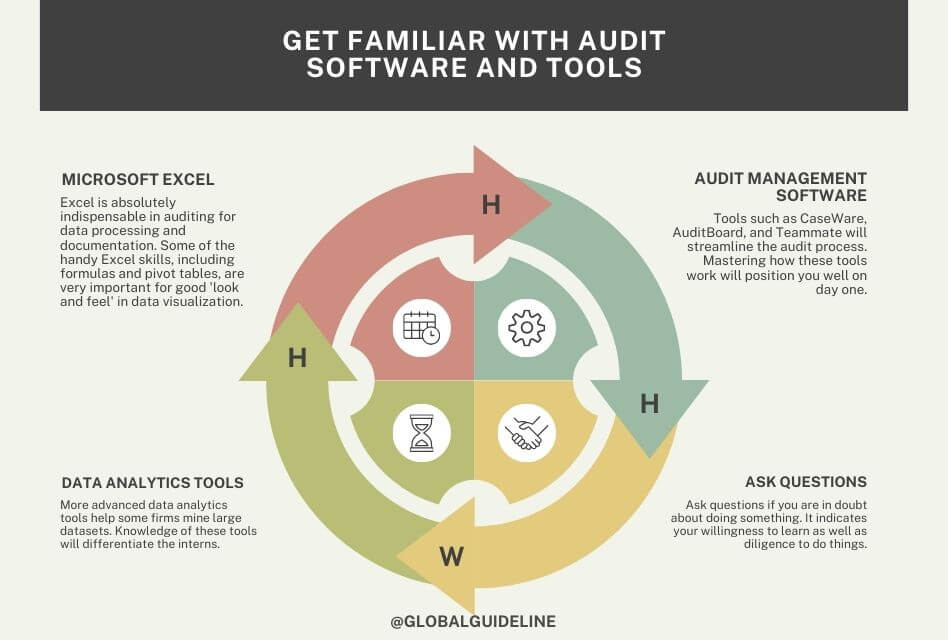
Audit Internship Interview Questions
Before appearing for an audit internship interview, one needs to prepare for asking both technical and behavioral questions. Below are some of the most common interview questions one may expect:
- What to know before an audit internship?
Be prepared to speak about the audit process, common software used in audits, and also a specific industry of the firm you are applying to. - How do you handle tight deadlines and high-pressure situations?
Auditing can be very stressful, primarily during busier seasons.
Employers will want to know how you manage your time and stress. - What is your experience with data analysis?
Auditing is full of data analysis. Be prepared to discuss relevant coursework and/or projects you have done. - How do you double-check your work for accuracy?
Auditing is a very detail-intensive profession. Be prepared to talk about your process for maintaining accuracy in your work. - Why are you interested in a career in auditing?
Employers want to know why you are looking into the field and what you will want to achieve in your career.
FAQs
1. What to prepare for the internship of an audit?
Before commencing your audit internship, prepare by getting familiar with the process for auditing, the tools that would be applied, and the industry in which the firm operates.
2. What is expected for an audit intern?
Usually, audit interns are expected to lend hand in the analysis of data and documentation as well as participate in the audit team. Proactiveness and readiness to learn about are always valued.
3. How do you perform well in an audit internship?
Good communication skills, knowledge of the audit software used, being proactive on your parts, and introspection will contribute to performance.
4. Is audit internship tough?
Difficult can be relative. It always depends on the extent of preparation. Thus, if properly prepared, then it is manageable and rewarding in experiences and opportunities.
5. What do Big 4 audit interns do?
Big 4 audit interns become a part of almost all the audit elements including data analysis, documentation, and sometimes client liaison.
6. What did you learn from your audit internship?
A helping of an audit internship teaches you data analyses, teamwork, and the audit process-building up a very good foundation for an accounting or finance career.
7. What do PwC Audit Interns actually do?
PwC audit interns typically engage in a variety of assignments, ranging from preparing audit reports to analyzing financial statements and assisting senior auditors.
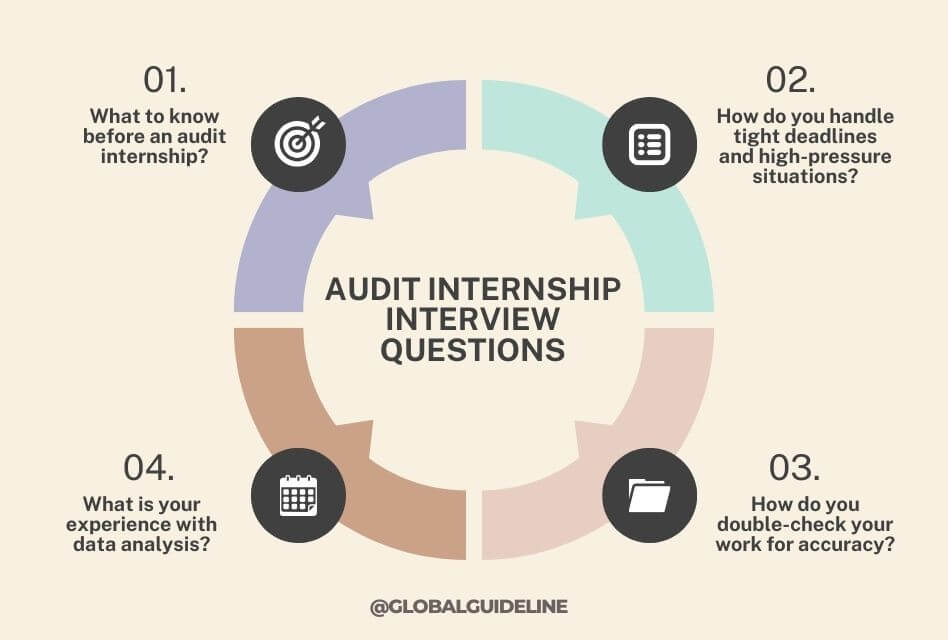
Conclusion
To pass as an audit intern, one needs knowledge of the must-know information on audit intern jobs and preparation, not to forget the proactive attitude, with a willingness to learn. Clearly, there is an impact one can make in making use of any course he learns through his audit internship. This study gives clear understanding of the audit process that lays grounds for proper communication with strong relations within, which is necessary for familiarity with things to know for audit internship success. Reflecting on experience and putting in time to document learning will not only help anyone grow but also prepare them for the other opportunities available in accounting and finance.
Whether it’s a Big 4 firm or some smaller public accounting firm, these top 5 things to know for audit intern success will allow you to walk into that role with confidence and set the stage for a successful career. Every experience you take on in your career is bound to help you learn and grow and pave your way towards future success in auditing.
Related Posts:
Does a Mailroom Clerk Work Alone? 4 Tasks to Consider
How Can 5 Entry Level Computer Science Jobs Help You Launch Your Career?

